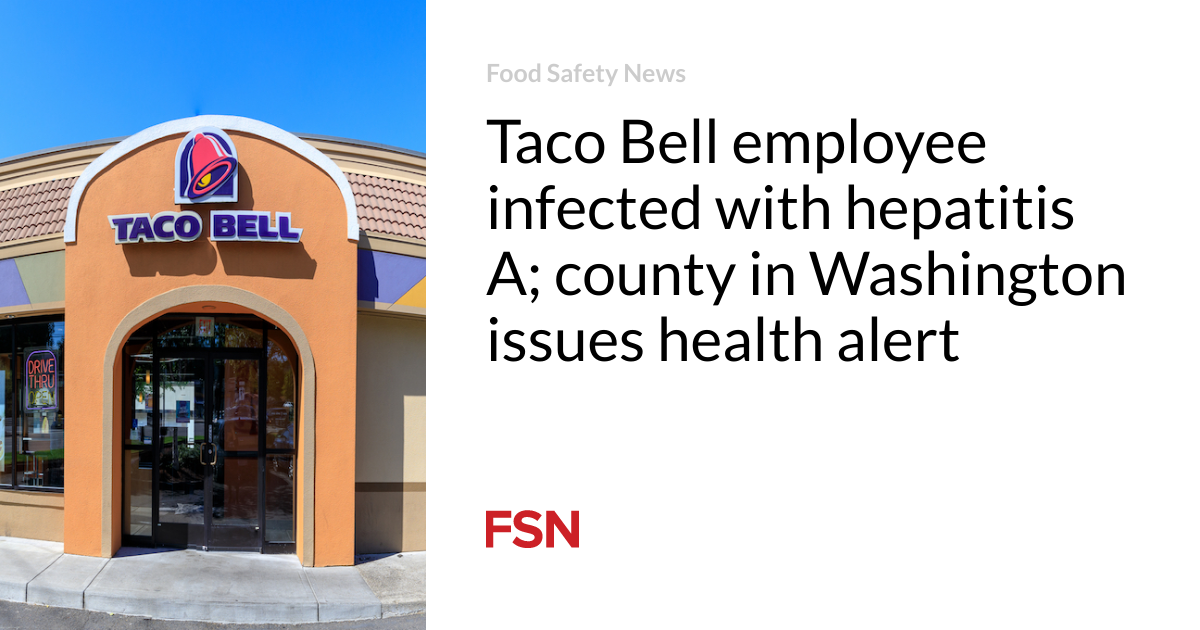
Health officials in Snohomish County, WA, are warning people who ate at two Taco Bell locations to monitor themselves for signs of hepatitis A infections and get vaccinated if they are not already.
“People who ate food from the Taco Bell at 2727 Broadway on May 22-23 or the Taco Tell at 303 91st Avenue NE in Lake Stevens on May 23 should contact their healthcare provider or public health,” according to the warning from the Snohomish County Health Department.
An employee who worked at both locations has tested positive for hepatitis A. The confirmed case appears to have been infected during international travel. The Snohomish County Health Department is working with the business to identify other workers who were potentially exposed and connect them with prevention information as well as resources for vaccination and post-exposure prophylaxis, as needed.
For two weeks after exposure a vaccination is effective from keeping the liver virus from developing. Therefore it is crucial for anyone who ate at the restaurants on the exposure dates to check their vaccination records.
The ealth department notice says that individuals who are not vaccinated, immune, or are unsure of their status should contact their healthcare provider or contact the Snohomish County Health Department at 425-339-3503 (then press 1) for guidance and potential post-exposure prophylaxis to prevent illness.
Post-exposure prophylaxis involves receiving the hep A vaccine or immune globulin (IG), which can provide immediate and lasting protection when given within two weeks of exposure to the hepatitis A virus. Hepatitis A vaccine is available from multiple healthcare providers or pharmacies in the county. Anyone who was exposed and is having trouble finding a vaccine provider, or who is uninsured or underinsured, should contact the Health Department.
People who were exposed should monitor themselves for any symptoms of illness. Stay home and do not prepare or serve food for others if you have symptoms. It takes between 15 and 50 days to become symptomatic after being exposed. Early signs of hepatitis A include:
- fever
- fatigue
- loss of appetite
- nausea
- vomiting
- diarrhea
- dark urine and jaundice (yellowing of eyes or skin)
- If you develop any of these symptoms, be especially thorough in handwashing after using the restroom and before preparing or handling food to avoid potentially spreading the illness further. Wash hands with soap and running water. Be sure to lather and scrub all surfaces including backs of the hands, wrists, between fingers, and under fingernails.
About hepatitis A
The hepatitis A virus lives in the fecesa or blood of someone who is infected and typically spreads through fecal contamination. The virus may be spread from person to person through close contact or through food handling. Consistent, thorough handwashing is essential to prevent spread through food handling.
The illness varies in severity, with mild cases lasting two weeks or less. More severe cases can last six weeks or longer. Some individuals, especially children, may not develop jaundice and may have an illness so mild that it can go unnoticed. However, even mildly ill people can still be highly infectious. Anyone with symptoms of hepatitis A and potential exposure who is not vaccinated or immune should consult a healthcare provider right away even if symptoms are mild.
